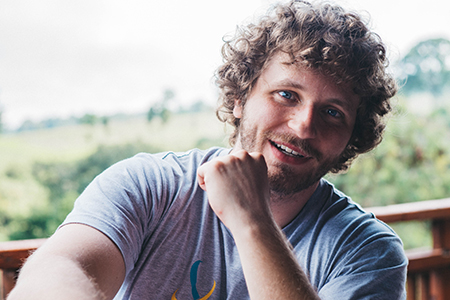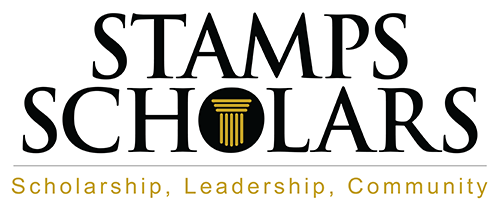Combining Science and Business in Social Enterprise
By Hannah Steinkopf-Frank

Photo by Eden Suoth
Elizabethtown College senior Tyler Butkus plans to use his background in the sciences in tandem with his entrepreneurial knowledge to lead innovative business projects in the field of social enterprise.
Butkus grew up in Tuscarora, Pennsylvania spending most of his time in the woods near his house in the heavily forested and mountainous area. He developed an interest in business from an early age and refined his passion alongside his dad, aunt, and grandparents, all of whom owned small businesses. “I was just fascinated by the concept of creating a company and making products that made the world a little bit better,” he said.
He graduated as Valedictorian from Tamaqua Area High School in 2014 and was drawn to Elizabethtown because of the college’s small size and welcoming atmosphere. He knew the Stamps Scholarship would provide financial support as well as the opportunity to network with a national community of scholars.
After taking a Business and Society class his freshman year, he decided to study business with a concentration in entrepreneurship, retaining his initial interest in chemistry by incorporating it as a double major. Outside of class, he trains independently as a power lifter. Last year, he qualified for the national championships for USA Powerlifiting. In his free time, he rebuilds and races classic muscle cars with his dad and is an avid whitetail deer hunter.
At the College, he has served as a class senator and treasurer. He is a member of the Student Affiliates of the American Chemical Society and was the president of Alpha Lambda Delta, the first year honor society. He is also a member of honor societies Delta Mu Delta for business and Gamma Sigma Epsilon for chemistry. He is currently the president of the College’s Social Enterprise Club. He also works for the High Center for Family Business, helping to organize events and analyze data from family business surveys.
He used his scholarship enrichment fund to do an Outward Bound program sailing on the coast of Maine with Stamps Scholars from around the country. He also went to the Czech Republic as part of an entrepreneurship class and met with local entrepreneurs. He recently spent two weeks in Pretoria and Cape Town, South Africa studying peace and conflict studies. He said, “I was amazed by the economic, social, and political infrastructures of the country.”
Beginning in the spring of 2015, he started working with Graybill Processing, which specializes in food waste recycling. Their core business involves converting food waste from the production of pastries and other food products into a nutritious feed for cattle that can be a substitute for corn. Black soldier flies (BSF) are a species of fly endemic to most tropic and temperate climates throughout the world. The larvae are capable of eating most forms of food waste, such as meat that might otherwise be left to rot in landfills. The colonies of larvae that develop reduce the production of methane, a powerful greenhouse gas, from the food waste while simultaneously reducing the potential for the development of disease.
He spent last summer designing, building, testing, and evaluating a commercial system for the conversion of food waste to feed for livestock using BSF. His hope is to continue refining the system and potentially incorporate it directly into an aquaponics and aquaculture system that could be deployed in developing economies, taking advantage of the resourcefulness of local entrepreneurs.
This summer, he traveled to Indonesia to learn Bahasa Indonesia, the country’s official language, through the US Department of State’s Critical Language Scholarship (CLS). CLS is an all-expenses paid scholarship for American students to travel and learn languages important to U.S. foreign affairs. Butkus decided to study Indonesian because of his work with food waste recycling and his hope to deploy a pilot system in the country. He is currently living with a host family in Malang taking intensive language classes.
For his senior year, he will be working on his capstone research in chemistry, which focuses on isolating and analyzing a pheromone that directs the oviposition of black soldier flies. He said it is a way for him to apply his interest in analytical chemistry to further refine the effectiveness of the recycling system. He will also be leading the Social Enterprise Club on partnering with local social enterprises to develop business plans, traveling to social enterprise pitches, and facilitating collaboration amongst the different departments within the College to exploit synergies that could lead to the development of new ideas.
After graduating, he plans to work a few years continuing to develop experience designing and refining innovative ventures. He is considering pursing international work or study abroad for college graduates. He is also interested in getting a Master’s degree in industrial engineering and is currently drawn to the Georgia Institute of Technology. While he is unsure exactly what he wants to do, his passion lies in small business and entrepreneurship, and he would like to one day own and build his own venture.
“Most importantly, I feel like the Scholarship was a show of trust in my ability to excel in the future, so it serves as a huge motivation for me to get up every day and push my limits rather than resting on my laurels; a lot of people out there thought that I was worth investing in, and I want to prove them right,” he said.
